Are you worried you might get scammed when buying foreclosed properties? Let’s learn from a real life example, and see what we can do to avoid getting scammed.
Scam victims share their experience (video)
In the video below, a lot of victims share how they were allegedly scammed by a 3rd party that sold foreclosed properties to them. Watch the video to learn more, and then I’ll share my insights.
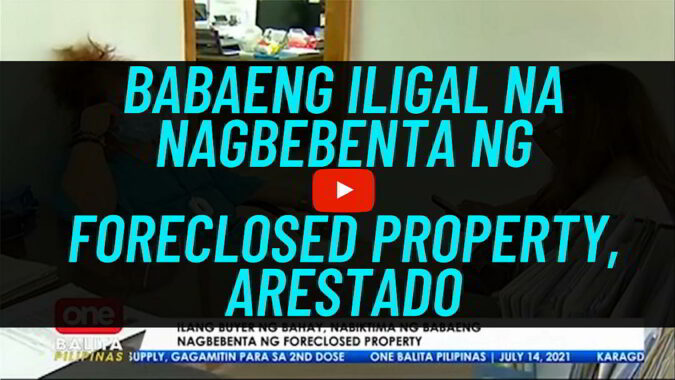
While I cannot comment on the company/person involved while the court case is ongoing (which also explains why I have to use the word “allegedly”, etc.), I can give advice/tips so that you can avoid getting victimized by something similar.
Here are my top tips to help you identify/avoid foreclosed real estate scams
Identify who legally owns the property you want to buy
As part of due diligence, you need to identify who legally owns a property, so that you can buy from the real owners. It doesn’t matter if a property is offered for sale by owner/developer or if it’s a foreclosed property.
You obviously need to buy only from the real owner(s).
How do you verify who owns a property? Check the title and tax declaration to see who is the registered owner. You can get a certified true copy from the Registry of Deeds or RD that covers your target property.
For the tax declaration, you can get a certified true copy from the City Assessor’s Office.
Note: For both Title and Tax declaration, you will need an authorization letter form the owner. If they can’t give you one, or they refuse, that is a red flag!
You can also check with the Home Owners Association (HOA) the status of the property and statement of account. Usually, the HOA will also ask for an authorization from the owners before they will provide any information. If you are dealing with the real owners, they can give you an authorization letter. If not, again, that’s a red flag!
Going back to the video, It appears it was the first time the victims talked with the HOA when they were prevented from entering the premises because they lacked “papers”. I believe if they checked with the HOA from the very beginning as part of due diligence, the HOA most probably would have told them who the real owners were, and they could have avoided getting scammed.
So, always check with the HOA if you are planning to buy a property within a village/subdivision. Check with the Condo Corporation if you are planning to buy a condo unit within a condo project/building.
Foreclosed properties from banks/institutions are for sale on an “as-is, where-is” basis.
Here’s a list of things you should ask when you do your due diligence: 31 Questions You Need To Ask Before Buying A Foreclosed Property
What to check If you are buying through a real estate broker/agent
While you need to identify the real owner before buying a property, it is perfectly okay for real estate brokers/agents to sell properties on behalf of the owner.
However, there are things you need to check to help make sure things will go smoothly and you won’t end up getting scammed.
Do they have an Authority To Sell or ATS?
First, you need to check if a real estate broker/agent is really authorized to sell a property. You can ask for a copy of the “Authority To Sell” or ATS from the owner.
For foreclosed properties from banks and other institutions that have foreclosed properties/acquired assets, the authority to sell is usually through an accreditation process. This means you need to verify if a real estate broker/agent is really accredited with a bank/institution.
In other words, you need to check if they are in good standing, or if they have been blacklisted and are no longer allowed to sell the bank/institution’s foreclosed properties. For some, their accreditation can lapse, but is quite easy to renew.
Note: Not all banks/institutions accredit real estate brokers/agents. For example, Pag-IBIG no longer allows brokers/agents to sell Pag-IBIG foreclosed properties. Interested buyers can only buy directly from Pag-IBIG.
What if the real estate broker/agent is NOT accredited or has no ATS? Then they won’t get paid any professional fee/commission if they sell properties, and they might resort to illegal practices like over-pricing, unauthorized service fees, etc.
The worst thing that can happen is when they get money from buyers (through downpayment/reservation fees, etc.), but the transaction is not valid because they are not authorized representatives of the real owners. In a scenario like this, buyers end up losing their hard-earned money.
Are they PRC licensed/registered?
In addition to the ATS and accreditation (for bank foreclosed properties), you also need to verify if a real estate broker is PRC licensed because of R.A. 9646 – The Real Estate Service Act of the Philippines or RESA Law.
In a nutshell, The RESA Law aims to professionalize the real estate industry by making sure only licensed real estate professionals who have have the necessary qualifications are allowed to sell properties. This gives buyers/sellers protection from unprofessional/unethical real estate brokers/agents who are unlicensed/unregistered.
For real estate agents (also referred to as salespersons), you need to check if they are registered under a PRC licensed real estate broker.
You can check the validity of a real estate broker’s license through the PRC website. See step-by-step article below, plus other info with regard to the RESA Law.
Recommended resources:
- How to check the validity of a Real Estate Broker’s License
- Real Estate Service Act of the Philippines (RESA) Signed Into Law
- RESA LAW IRR published last July 24, 2010
- Are you violating the RESA Law?
- What’s the difference between a Real Estate Salesperson and Real Estate Broker
- Beware of Illegal Real Estate Brokers and Developers
Never make payments to real estate brokers/agents
If you are buying A property through a real estate broker/agent, you should never make any direct payments to them.
Why not? Because things can go wrong like the following:
- They (the real estate broker/agent) might get tempted to use or keep the money for themselves
- For scammers/con-artists, this is a perfect chance for them to get your money
- What if they get robbed before they’re able to remit the cash to the seller (or what if the money gets lost)?
Actually, I already wrote a detailed article about this, check it out through the link below:
If you are financing a property purchase, get a mortgage loan
If you are buying a property through financing (you are getting a loan), then get a housing loan (don’t get a personal or cash loan) so that the bank can help identify problems with the collateral (the property). Let me explain…
In the video, I can’t help but feel sorry for the newlyweds, “Lito” in particular, who got a loan, lived a frugal life to save money, paid for the loan in full, but they still couldn’t move-in.
I believe “Lito” got a “personal loan” or “cash” loan (or something similar), which leads me to this suggestion: Always get a housing loan if you plan to get financing for a property purchase.
With a housing loan (a real estate mortgage loan to be exact), the requirements are very strict. One requirement is for the title to be in the name of the owner/seller.
In the video, it appears the company was acting as if they were the owners of the property (they were asking the buyers to pay the downpayment to them directly… more on this later), and if it was true that they owned the properties, they would have had no problems with transferring the titles under their name.
But in this case, if the buyers applied for a real estate mortgage loan, it would not get approved because they (the company selling the property) can’t transfer the title under their name (because they don’t own the properties according to the video), and “Lito” would have quickly known that they were being scammed.
Identify fake owners/sellers of foreclosed properties
Another thing I noticed with the video was the alleged scammer’s “modus” (this is according to the NBI) where buyers were asked to make a downpayment and submit documents. I believe this is a red flag because a third party was asking for money to be paid to them directly. Let me explain…
My line of thinking if I encounter a similar situation would be like this:
- If they are a brokerage company selling foreclosed properties, and they asked me to pay a downpayment directly to them, I would not agree to this because I believe any payment should be made directly to the owner of the foreclosed property. Any demand for me to pay them would lead me to believe they are not legit or they are fake sellers.
or
- If they are a company that are into “buy and sell” (they are going to “flip” the property), it would make sense that I will make a downpayment to them since they already own the property. However, I will need proof that they legally own the property (through the other steps I mentioned above). If they cannot provide proof, then that would certainly make me very suspicious, and unless they can address all my doubts, I will have to conclude they are scammers and “fake” sellers.
One more thing with regards to those who are “flipping” foreclosed properties, it can take a long time for the title to get transferred under their name, but they can legally sell the property already. You just need to confirm if they are really the new owners by checking with the bank/entity where they bought the property from. You might even find the selling bank/entity by doing a quick “Google” search (more on this below).
By the way, the video mentions that the foreclosed properties were fake. Actually, the foreclosed properties are legit (Based on the pictures in the video that showed the lot and block numbers, the property was from an old listing of BFS foreclosed properties). What’s fake in this case is when a 3rd party allegedly sells these foreclosed properties as if they own them, in other words “fake owners”. Of course, if this has to be proven beyond reasonable doubt through the courts.
Bonus tip: Make a quick “Google” Search for a property before you buy it
Another thing I would suggest that you do before proceeding with the purchase of a property is to make a quick search using Google. Simply look for the same property (same address, size, etc).
When you find the property in a listing on websites like Lamudi, Property24, or even my own website ForeclosurePhilippines.com*, that can be a red flag, unless the property is already sold. All you have to do is contact the bank/institution that had listed your target property, and confirm if the property was already sold or not.
If the subject property was confirmed sold, then you just have to verify who is the new owner of the property (again, through the other steps I mentioned above). It might be true that a 3rd party has already bought the property and is selling it to you (they are “flipping” the property. Again, you need to verify that they are the new owners of the property as part of due diligence.
However, If the subject property remains available, and yet a 3rd-party is selling it as if they own it (they are asking you to make a downpayment directly to them), then that is a big red flag! It is time for you to do an extra-ordinary amount of due diligence, and please don’t proceed with the purchase until you sort things out!
*Fun fact, I have lost count of people who thanked me because they were able to identify the real owner of a property when they found it inside the listings I share here in ForeclosurePhilippines.com (they ended up here after doing a quick “Google” search). They found out that a certain bank or institution was the real owner of a property they were planning to buy or invest in. This either helped them avoid getting scammed, or they found out they were scammed which helped them take appropriate action. Others simply wanted to find out the name of the bank/institution that owns the property.
Yes, “Google” is our friend!
Conclusion
In summary, here’s a list of things you should do before buying a foreclosed property and avoid getting scammed:
- Always verify who legally owns a property and deal with them directly
- A. Check the title/tax declaration
- B. Check with the Home Owners Association or HOA if buying inside a village/subdivision or the Condo Corporation if buying a unit within a condo project.
- If you are buying through a real estate broker/agent, check the following:
- A. Do they have a valid Authority To Sell (ATS) or are they accredited and authorized to sell foreclosed properties from a bank/institution?
- B. Are they PRC licensed real estate brokers?
- C. If they are agents, are they registered under a PRC licensed real estate broker?
- Once you identify who legally owns a property, always make direct payments (for example: Downpayment, Reservation Fee, etc.)
- If you are getting a loan, get a housing loan (don’t get a personal or cash loan) so that the bank can help identify problems with the collateral (the property).
- Identify and avoid “fake” owners/sellers of foreclosed properties before proceeding with any purchase.
- Bonus tip: If a property was part of a listing from a bank/institution, you will find it through a quick google search, then you can verify if they still own it. Yes, Google is your friend. 🙂
How about you, got any tips to share? Did you encounter something similar in the video? Let us all know through the comments.
Good luck and happy real estate investing!
~ Jay Castillo
P.S. Most of the tips I shared above are already inside my due diligence checklist which is a free gift to all email subscribers. I said “most” because I have to update the checklist to include the tips for buying foreclosed properties through real estate brokers/agents. I’ll do this as soon as possible.
Who to contact if you need help (NBI contact info)
If you experienced something similar and need help, my advice is to contact the National Bureau of Investigation or NBI as soon as possible.
If you will notice, the victims in the video above asked assistance from the NBI, and I believe it would be best for you to do the same.
You may find NBI’s contact details on the following page on their official website: https://nbi.gov.ph/contact-us/



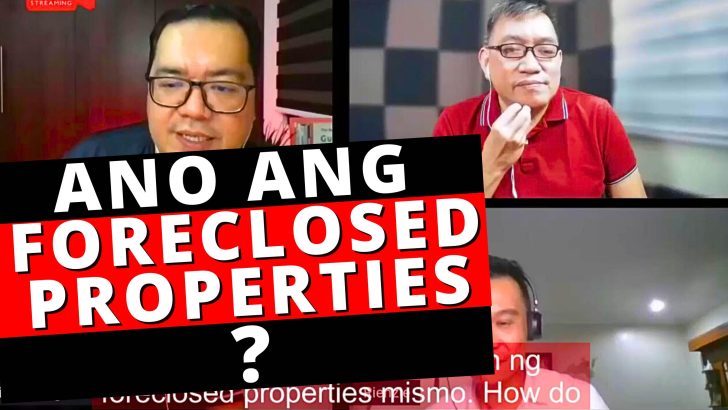
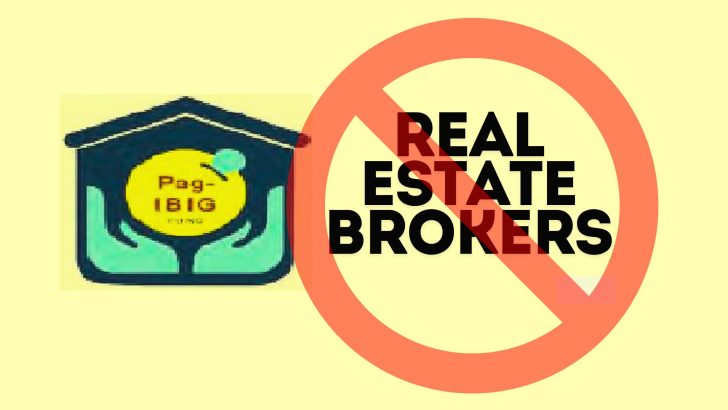
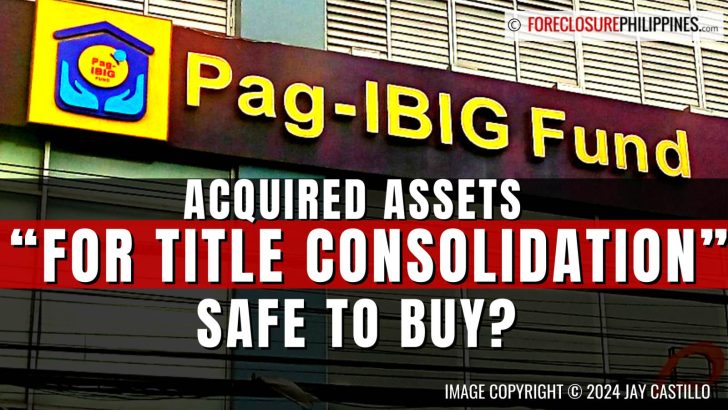
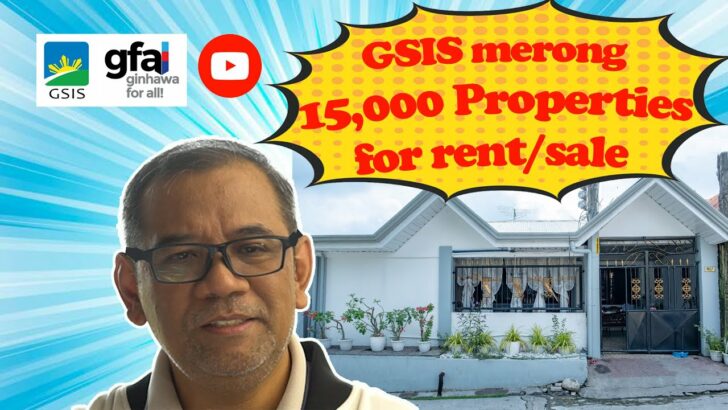
![Why invest in foreclosed properties in the Philippines? + Top things to consider [Video] 6 Why invest in foreclosed properties in the Philippines? + Top things to consider [Video]](https://www.foreclosurephilippines.com/wp-content/uploads/2023/03/video-how-to-invest-in-foreclosed-properties-in-the-philippines-v3-728x410.jpg)
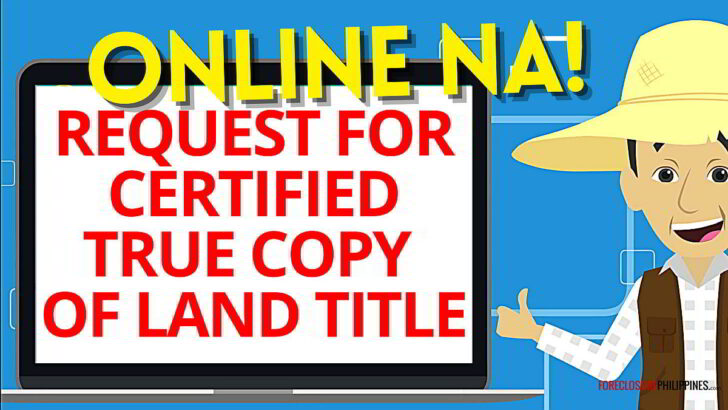
Hi Jay,
I have the same experience with the same name of the person and company above.
Please help me. Thank u.
Hi Ms. Beth, sorry to hear this also happened to you. I highly suggest that you contact the NBI directly. Eto po contact details ng NBI sa official website nila: https://nbi.gov.ph/contact-us/
Hi Jay,
Please help. I am a victim of scam.
HI Ms. Beth, sorry for the late reply. Kagaya po ng nabanggit ko sa isang cooment niyo, kontakin niyo agad ang NBI as soon as possible. Makikita niyo po ang contact info ng NBI sa official website nila: https://nbi.gov.ph/contact-us/
Thank you for your information and advisory.
God bless..
You’re welcome Ms Luzviminda. Thank you also for the comment. God bless you too!
I thought I had already seen the best of you, Sir Jay. But with this new article, I thought I was reading one of my favorite books. So much information and yet very lively to read.
I hope to see more articles likes this. Thank you!
Wow, thank you Alfred for the kind words, really appreciate it! Yes, I look forward to publishing more articles like this, andami kasing listing updates si Pag-IBIG kaya madalas yun pa lang naubos na oras ko. I’ll do my best to focus more on real estate investing. Thanks again for dropping by Alfred!
Better to get a photocopy of title and tax dec from owner or broker. These can be checked respectively with rd and assessor’s office.
Thanks again for the inputs Jun! For banks that sell foreclosed properties, most will provide photocopies of the title and tax dec upon request. For private sellers and individuals, there are a few who are paranoid and would want to make sure a prospective buyer is serious before they will provide a copy.
7/26/21
Hi Jay,
Just one obervation.
One does not need a letter of authorization from the owner of a property to get a copy of the title from the registry of deeds or a tax declararion from the assessor’s office.
Just give basic info like name of owner and address of properry, and pay the corresponding fee.
Voila you can get a copy of the title or tax dec.
For the title you may have to wait for a few days. As for the tax dec, you can get a copy after paying the fee.
Hi Jun, thanks for the inputs. Yes, we observed that sometimes, we do not need an authorization letter. The requirement started because of a LRA Circular 05-2006 (Please see this article for your reference: https://www.foreclosurephilippines.com/certified-true-copies-titles-require-identification-authority-quezon-city-registry-of-deeds/), and now, some RD’s like Quezon City technically require an authorization letter. I also saw the same circular posted in the Las Pinas RD.
However, I do notice sometimes that they are not that strict and don’t ask for an authorization letter when we get certified true copies (so parang tsambahan, depende siguro sa mood ng naka duty?).
Same goes with the Tax Declaration, and the reason is due to the Data Privacy Act. But again, tsambahan, minsan required ang authorization letter, minsan hindi. 🙂
Will check the link for the lra circular and read it.
Dear Jay, A good informative article ,well prepared ,well explained, the “due diligence” is of course just common sense, would you buy a car without the OR/CR, ? SAME APPLIES TO PROPERTY.
Thank you Trevor! Yes, checking the title and tax declaration should be obvious and common sense, which is why it’s sad that people still end up getting scammed. 🙁